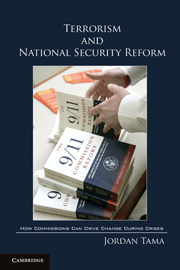Book contents
- Frontmatter
- Contents
- List of Figures and Tables
- Acknowledgments
- 1 Commissioning Reform
- PART ONE PATTERNS OF COMMISSION INFLUENCE
- 2 A Theory of Commission Influence
- 3 The Impact of National Security Commissions
- PART TWO COMMISSIONS AND COUNTERTERRORISM POLICY
- PART THREE CONCLUSION
- Appendix A Construction of the Data Set
- Appendix B National Security Commissions, 1981–2006
- Appendix C List of People Interviewed
- References
- Index
2 - A Theory of Commission Influence
Published online by Cambridge University Press: 05 June 2012
- Frontmatter
- Contents
- List of Figures and Tables
- Acknowledgments
- 1 Commissioning Reform
- PART ONE PATTERNS OF COMMISSION INFLUENCE
- 2 A Theory of Commission Influence
- 3 The Impact of National Security Commissions
- PART TWO COMMISSIONS AND COUNTERTERRORISM POLICY
- PART THREE CONCLUSION
- Appendix A Construction of the Data Set
- Appendix B National Security Commissions, 1981–2006
- Appendix C List of People Interviewed
- References
- Index
Summary
This chapter sets the framework for the book's empirical analysis by formulating a theory of commission influence. The theory is grounded in the notions that a special impetus is often needed to induce Congress and the president to adopt reforms, and that commissions are uniquely capable of providing this impetus. I explain why obstacles to reform often exist and how the distinct political credibility of commissions enables panels to overcome them. I also outline the circumstances in which commissions are likely to be able to turn their credibility into impact.
The Drivers of Commission Impact
Any theory of commission influence must begin with an understanding of why policy makers form panels in the first place. Prominent political science theories argue that policy makers often delegate authority to institutions in order to obtain expertise or facilitate the reaching of agreement (Epstein and O'Halloran 1999; Hawkins et al. 2006b). Scholars have developed and tested these and other theories by examining delegation to congressional committees, government agencies, regulatory bodies, permanent advisory panels, and international institutions (Balla and Wright 2001; Hawkins et al. 2006a; Kiewiet and McCubbins 1991; Lewis 2003).
Scholars of ad hoc commissions, for their part, have identified many reasons why policy makers form commissions, including to obtain ideas, build consensus, generate political cover, defuse public pressure, preempt an unwanted initiative, overcome congressional gridlock, or circumvent bureaucratic obstructionism (Campbell 2002; Dean 1969; Filtner 1986; Halperin 1961; Kitts 2006; Marcy 1945; Popper 1970; Tutchings 1979; Wolanin 1975; Zegart 2004).
- Type
- Chapter
- Information
- Terrorism and National Security ReformHow Commissions Can Drive Change During Crises, pp. 13 - 43Publisher: Cambridge University PressPrint publication year: 2011



